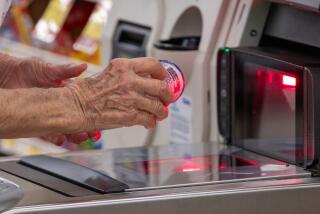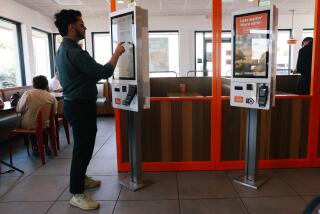Companies make healthful food options more readily available to workers
Youâre trying to eat more healthfully, but like many of us, youâre also working harder. So what happens when you really need a snack before that late-afternoon staff meeting? Too often, the easiest option is a candy bar from the vending machine in the break room.
But some companies are ditching that model and finding ways to up the nutritional ante on in-house snacks and meals. In fact, the term âvending machineâ doesnât always quite work these days.
At Team One, an ad agency in Los Angeles, thereâs a refrigerator case and shelves with waters and teas, chia drinks, popcorn, salads, energy bars and other choices. Employees scan their purchases at the âmicro-marketâ and pay with a thumbprint thatâs connected to their credit cards.
âI think thereâs definitely a negative connotation to regular vending machines in the corporate atmosphere,â said Sean Kelly, co-founder and chief executive of H.U.M.A.N. (Helping Unite Mankind and Nutrition). His company, based in Culver City, supplies Team One as well as Tesla Motors and other locations with healthful food for vending machines, micro-markets and snack subscription boxes.
H.U.M.A.N.âs markets are meant to be small, healthful at-work convenience stores, Kelly said. Customers can pick up the food and read the labels before they decide to buy.
In Chicago, Farmerâs Fridge founder Luke Saunders said he was dismayed by the food he was stuck eating when he traveled. It was âdepressing when you have to eat a grab-and-go item.â Now Farmerâs Fridge is bringing healthful, locally sourced food to vending machines and kiosks around that city, including one at the OâHare airport Marriott. He has plans for salad vending machines in Los Angeles sometime next year.
Healthful vending remains a small fraction â maybe a few thousand â of the 2 million vending machines in place around the country, says Nick Yates, founder of Fresh Healthy Vending in San Diego. But, he adds, the demand for more healthful choices in company break rooms and other spots is growing.
âOnce you educate the right person, they get it,â says Yates, whose products include breakfast sandwiches, dried fruit and nuts, and are sold at a car dealership and a law firm, among other clients.
âLots of companies are making small changes,â says Dr. Norm Campbell, coauthor of a paper in the Canadian Journal of Cardiology that calls for policies to create more healthful options. âCompanies are learning that healthier employees have less absenteeism and greater productivity.â
In California, many communities have instituted regulations for what sorts of food and drink can be sold in public places such as parks or courthouses. And whatâs sold at schools is also governed by federal and local regulations.
âThere definitely has been a shift in the last five years toward putting policies in place,â says Katherine Bishop, one of the authors of a report on vending machines written for the advocacy group Center for Science in the Public Interest. The report found that just 5% of the vended foods on public property were healthful, but more states are beginning to change, Bishop adds.
âA growing part of our industry is the âbetter for youâ category,â says Roni Moore, vice president of marketing for the National Automatic Merchandising Assn.
At about 16,000 vending sites, she says, there are âFit Pickâ stickers on machines and nutrition labels. The next wave, she said, is unattended retail kiosks. Today there are 5,000 such micro-markets nationwide, but itâs projected in five years that there will be 35,000.
Amy Mackinnon, director of office services for Team One, says the company pays serious attention to the health of its employees. âI think things are really shifting. Iâve seen it even in the seven years Iâve been here. People are health-conscious, weight-conscious. If we served burgers and fries for lunch, thereâd be a lot of frustrated people.â
Instead, the choices this day in the refrigerated case include grilled chicken with yams; a turkey bowl with brown rice, beans and vegetables; and a Paleo almond chicken dish. Entrees are about $5 to $7, Kind bars are $2.25, Pop Chips are $1.49 and Steaz is $2.09.
âIf you want Doritos, thatâs fine,â Mackinnon says, âbut youâll have to supply them yourself.â
Twitter: @mmacvean
More to Read
Inside the business of entertainment
The Wide Shot brings you news, analysis and insights on everything from streaming wars to production â and what it all means for the future.
You may occasionally receive promotional content from the Los Angeles Times.











